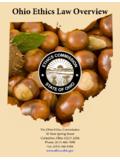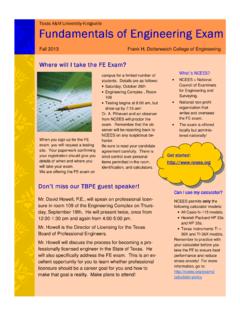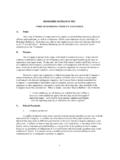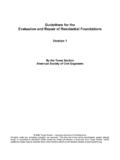Transcription of THE VOICE OF ETHICS - ethics.ohio.gov
1 - Henry Wadsworth LongfellowIt takes less time to do things right than to explain why you did it Quarter 2A Publication of the Ohio ETHICS CommissionTHE VOICE OF ETHICSC lick here to see our brief e-coursesThe Commission recognizes, though, that many questions arise regarding specific areas of the law. As a result, we have also created numerous short e-courses specific to topics ranging from gifts to nepotism to conflicts of interest. This year, we are offering something different! The two newest e-learning options provide an insight into the ETHICS Commission s advisory and investigative processes.
2 These courses can be a helpful and easy way to understand how the Commission tackles requests for advisory opinions as well as the investigative there an e-course you would like to see on our website? Let us know; we d love to hear your ideas!Click here to take the 2018 e-courseEach year, the Ohio ETHICS Commission unveils a new e-course to provide an overview of the Ohio ETHICS Law. The course is approximately 75 minutes long and serves as a convenient and cost-effective learning tool for state and local government. The 2018 e-course, The Ohio ETHICS Law: Upholding Trust in Government, is already receiving positive E-Courses Released!
3 The IssuePublic agencies often promote economic and business development by supporting private businesses that develop property, construct facilities or make other community improvements Violations of the ETHICS Law can occur if a public official or employee has a connection with a private organization seeking aid from the member of a port authority board is prohibited from receiving a definite and direct profit or benefit if the company for which the board member works is participating in a port authority bond program. Possible OutcomeIt is possible that the company could participate in the program provided that the board member meets specific exceptions described in the ETHICS Law and does not take any action to approve the company s receipt of economic aid or secure other benefits for the company.
4 Bottom LineBecause the Ohio ETHICS Law prohibits public officials and employees from having an interest in the contracts of the public agencies they serve, caution should be observed here! Using one s public position to secure or authorize anything such as grants, loans, tax abatements, or other forms of economic aid from the public official or employee s public agency is Economic Aid to Private BusinessIn the face of increasing fiscal challenges, government agencies continue to explore new ways to provide services to citizens in an economical and efficient manner.
5 In fact, it is common for public agencies to form cooperative partnerships with private corporations, nonprofit organizations, and other beneficial collaborations give public agencies access to the expertise and resources in the private sector, and allow private sector entities to financially and intellectually contribute to their communities. However, such cooperative arrangements can also give rise to conflicts of interest under the Ohio ETHICS article will address some of the common questions and concerns that can arise under the ETHICS Law due to interactions between public agencies and private businesses or organizations.
6 Public Private PartnershipsThe IssuePicking up a tab for dinner, offering tickets to a ball game, taking in a round of golf with a client may be neither rare nor illegal in many cases in the private sector. Things change, though, when the private sector interacts with public employees and Ohio ETHICS Law prohibits public employees and officials from accepting substantial things of value from agency vendors (or potential vendors), regulated parties, or those with specific interests before the public agency. The private sector is equally prohibited from providing substantial things of value to public officials and employees.
7 Substantial things of value could include consulting fees, golf outings, expensive meals, travel expenses, etc. It is important to note, however, that private entities may donate items or services to assist public agencies in fulfilling its responsibility to provide services to the public as long as no public official or employee personally benefits from the donation. ExampleA city official is prohibited from accepting season tickets to the games of a professional sports team from the team s owner because the value of the tickets is substantial and the team is regulated by the , the team s owner would not be prohibited from donating sports equipment to the city s parks and recreation department for use in its public programs.
8 Possible OutcomeAgain, provided that a donation is voluntary and no agency official or employee benefits personally from it, private entities may donate items or services to a public of a substantial nature, however, may not be offered or provided to public officials or employees from companies that sell (or wish to sell) goods or services to the public agency, are regulated by the agency, or have a specific interest before the LineThere are numerous advisory opinions in the ETHICS Commission archives regarding gifts and donations. Take advantage of this resource!
9 Companies or Private Companies Providing Gifts, Donations, or CompensationThe IssuePrivate sector entities that have regulatory or business ties with public agencies work with public officials who are very knowledgeable about the business in which the private entity is engaged. Private entities may wish to recruit these qualified and experienced public employees for positions in their own environmental engineering firm that frequently submits permit applications to the Ohio Department of Natural Resources wishes to extend a job offer to an employee at that agency.
10 Possible OutcomeThe Ohio ETHICS Law prohibits promising or giving anything of value to a public official or employee that could have an improper influence on the official or employee. The promise of future employment is within that definition. If a public official or employee is able to withdraw completely from consideration of any matter involving the party who is promising or giving him or her employment, the official or employee may be able to consider and accept the LineIf a public official or employee wishes to seek employment from a party that is doing or seeking to do business with, interested in matters before or regulated by his or her public agency, he or she must be able to completely withdraw from matters that affect the party.








